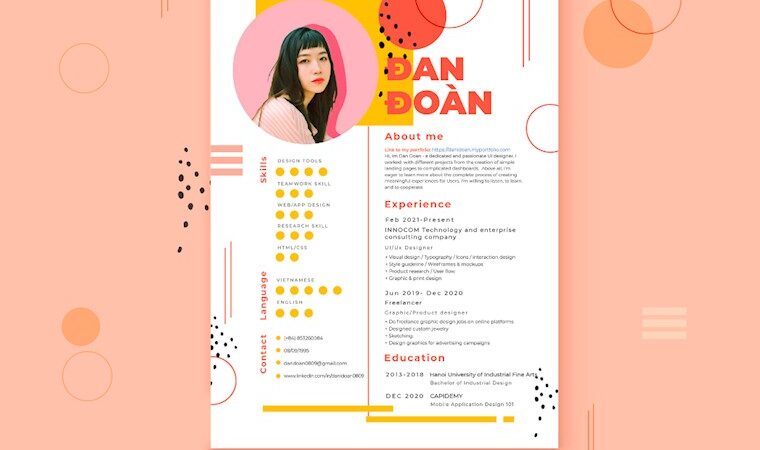Writing a resume can be a stressful and time-consuming endeavor. But with the right guidance and tips from a professional resume writer, you can create a winning resume that will make an impression.

This blog post will provide simple resume-writing tips to help you get started. With these helpful hints and tips, you can craft a resume that is sure to stand out from the competition and get ready to answer the gold sell me this pen interview question!
Table of Contents
What Is a Resume?
A resume is a document that provides an overview of a person’s education, work experience, skills, achievements, and other relevant information. It is usually submitted as part of a job application to demonstrate that the applicant is qualified for the job they are applying for.
The importance of a resume cannot be overstated, as it is often the first impression a potential employer will have of a candidate. A well-crafted resume can help a candidate stand out from the competition and increase their chances of landing an interview.
Who Needs a Resume?
Anyone looking for a job or planning to apply for a new job needs a resume. This includes recent graduates, professionals looking to change careers, or individuals re-entering the workforce after a hiatus.
Check out:
- 47 Creative Designer Resumes: Ideas & Templates
- 35 Free Modern Resume Templates For Word
- 77 Free Creative Resume Templates To Download
A resume is also necessary for individuals seeking freelance or contract work, as it is a portfolio of their skills and experience. Regardless of the field or level of experience, a well-written and well-presented resume can open doors to new career opportunities.
Resume Writing Tips: Format and Structure
The format and structure of a resume can make a significant difference in how potential employers perceive it. Here are some formatting tips to help you create a professional-looking resume:
1. Choose the right resume format
There are three main resume formats: chronological, functional, and combination. Choose the one that best highlights your skills and experience.
- The Chronological Resume Format lists your work experience in reverse chronological order, starting with your most recent job. It highlights your career progression and best suits those with a consistent work history. It’s the most commonly used format and is preferred by most employers.
- The Functional Resume Format focuses on your skills and achievements rather than your work experience. It groups your skills and experiences into categories and highlights your accomplishments under each category. This format best suits those with gaps in their work history or changing careers.
- The Combination Resume Format is a blend of both chronological and functional formats. It highlights your skills and achievements while listing your work history in reverse chronological order. This format best suits those with a strong work history who want to showcase their skills and achievements. It’s also useful for those who want to change careers or have gaps in their work history.
Generally, chronological resumes are best for experienced candidates, while functional resumes are great for entry-level applicants.
2. Use a clear and easy-to-read font
Stick to standard fonts such as Arial or Quicksand, and make sure the font size is between 10 and 12 points.
Now, you may be wondering why to use a clear font. Using a clear and easy-to-read font is essential when writing a resume because it can greatly impact the readability and professionalism of the document. Here are some reasons:
- Makes it easy for recruiters to read: When recruiters receive many resumes for a single job posting, they often have limited time to review each one. Using a clear and easy-to-read font can make it easier for them to scan your resume and identify your qualifications and experience quickly.
- Improves readability: A clear and easy-to-read font can improve the overall readability of your resume. A font that is too small or fancy can be difficult to read, causing recruiters to skip over important information.
- Demonstrates professionalism: Using a clear and professional font demonstrates that you are serious about the job and have put effort into crafting a well-written resume. It can also help to create a positive first impression with potential employers.
- Avoids distractions: Using a clear and simple font can help to avoid distractions that might come with using a more decorative font. A font that is too ornate or complex can take away from the content of the resume and distract the reader.
3. Stick to one or two pages
As mentioned, recruiters and hiring managers receive many resumes, so keep your resume concise and limit it to one or two pages. This will also help ensure that your most important information stands out.
It’s important to stick to one or two pages when writing a resume for several reasons:
- The attention span of recruiters: Recruiters are often inundated with resumes and typically spend only a few seconds scanning each one. If your resume is too long, it will likely be discarded without being fully read. Keeping your resume to one or two pages makes it more likely to be read in full.
- Clear and concise presentation: A shorter resume is generally easier to read and comprehend. By sticking to one or two pages, you’ll be forced to be more selective in the information you include, which can help you present a clear and concise picture of your qualifications.
- Emphasize your most relevant experience: Limiting your resume to one or two pages will force you to focus on your most relevant experience and skills. This can help to highlight your strengths and make you a more attractive candidate to potential employers.
- Avoid overwhelming the reader: A resume that’s too long can overwhelm the reader, making it difficult for them to pick out the most important information. Sticking to one or two pages will make it easier for the reader to identify your qualifications and experience quickly.
4. Use bullet points
Using bullet points in a resume effectively organises and presents your qualifications, achievements, and experience. Here are some reasons why bullet points are useful:
- Easy to read: Bullet points break up dense blocks of text and make it easier for recruiters to scan your resume quickly. They help to draw attention to important information and make your resume more visually appealing.
- Organized presentation: Bullet points help to organize your resume clearly and concisely. They make it easy to present your experience and achievements in a format that is easy to read and understand.
- Emphasize important information: You can use bullet points to emphasize important information, such as key accomplishments or job responsibilities. This helps to highlight your strengths and makes it easier for recruiters to see how you can contribute to their organization.
- Consistent formatting: Using bullet points helps to maintain consistent formatting throughout your resume. This creates a professional appearance and makes your resume easier to read and understand.
When using bullet points in your resume, it’s important to keep them brief and to the point. Use action verbs to start each bullet point, and focus on your achievements and accomplishments.
5. Include white space
Use white space to make your resume visually appealing and easy to scan. This means leaving adequate margins, spacing out your text, and avoiding blocks of text that look intimidating to read.
Overall, when it comes to resume writing, format and structure matter! Choosing the right format, using a clean font and leaving enough white space will ensure your resume stands out from the crowd and gets noticed by potential employers.
Resume Writing Tips: Content
Writing a successful resume isn’t just about including and formatting the right information correctly but also choosing the right words to make an impression. But what information should you include when writing a resume? Read on.
1. Customize your resume for each job application
Tailor your resume to the job you’re applying for by highlighting the skills and experiences most relevant to the job description. This can help you stand out from other candidates and show the employer that you are a good fit for the role.
Including relevant skills on your resume is essential to demonstrate to the employer that you have the qualifications for the job. Here are some tips on what skills to include in your resume for each job application:
- Review the job description. Look at the job description to identify the specific skills and qualifications the employer seeks. This will give you a good idea of what skills to highlight on your resume.
- Include hard and soft skills. Include a mix of hard and soft skills on your resume. Hard skills are specific technical abilities that you have acquired through training and experience, while soft skills are personal qualities and attributes that make you a strong employee.
- Be specific about your skills and qualifications. For example, instead of just saying you have “communication skills,” give examples of how you have demonstrated these skills in previous roles.
Examples of skills to include in your resume will vary depending on the job you’re applying for. Here are some examples of skills to consider for different types of roles:
Sales job:
- Relationship building
- Negotiation skills
- Sales strategy development
- Customer service skills
Marketing job:
- Social media marketing
- Content creation
- Analytics
- Marketing strategy development
IT job:
- Programming languages
- Database management
- Network security
- Problem-solving skills
Administrative job:
- Time management
- Attention to detail
- Organization skills
- Customer service skills
Healthcare job:
- Clinical skills
- Patient care skills
- Medical terminology
- Attention to detail
By including relevant skills on your resume, you can increase your chances of being considered for the job and demonstrate that you have the qualifications for the role.
2. Use keywords from the job description
When writing your resume, it’s important to use keywords from the job description to increase your chances of getting past automated resume screening software and catching the attention of the employer.
Look carefully at the job description and make a list of the keywords and phrases that are most relevant to the job. This might include specific technical skills, job titles, or industry jargon.
And then, use the keywords in your summary and work experience. Incorporate the keywords into your summary statement and work experience section. For example, if the job description emphasizes experience with a specific software program, make sure to mention your experience with that program in your work experience section.

However, don’t overuse the keywords. While using keywords in your resume is important, you don’t want to overdo it. Use the keywords naturally and relevantly, and ensure your sentences flow and make sense.
Simply said, using keywords from the job description in your resume can increase your chances of getting noticed by the employer and getting past automated resume screening software. Just be sure to use the keywords naturally and relevantly and avoid overdoing them.
3. Highlight your achievements
When writing your resume, highlight your achievements to demonstrate to the employer that you have a track record of success and can make a valuable contribution to their organization. Here are some achievements to consider highlighting on your resume:
- Sales or revenue growth: If you’ve been able to increase sales or revenue in your previous roles, make sure to highlight this on your resume. For example, if you were able to increase sales by 20% in your last sales role, include this as an achievement.
- Cost savings or process improvements: If you’ve been able to save money or improve processes in your previous roles, make sure to highlight this on your resume. For example, if you were able to reduce production costs by 10% through process improvements, mention that.
- Awards or recognition: If you’ve received any awards or recognition for your work, make sure to include this on your resume. For example, if you were named “Employee of the Year” or received a “Top Performer” award, highlight this on your resume.
- Project success: If you’ve successfully managed or contributed to a project that achieved positive results, make sure to highlight this on your resume. For example, if you were part of a team that launched a new product that was a commercial success, highlight this experience as an achievement.
- Team leadership: If you’ve successfully led a team to achieve positive results, make sure to highlight this on your resume. For example, if you were able to improve team productivity by 30% through effective leadership, include this as an achievement.
When highlighting your achievements on your resume, be specific and quantify your results wherever possible. Use numbers and statistics to demonstrate your impact in previous roles and make your achievements more impressive. Highlighting your achievements can help demonstrate to the employer that you have a track record of success and are a valuable candidate for the job.
4. Use action verbs
When writing a resume, using active rather than passive voice is important. Active voice is more effective because it emphasizes your achievements and makes your resume more engaging for the reader. In active voice, the subject of the sentence acts, while in passive voice, the subject receives the action. For example, instead of saying, “Responsibilities were handled by me,” say, “I handled responsibilities.”
Active voice makes your resume more concise and easier to read, which is important when recruiters often spend just a few seconds scanning resumes. By using active voice, you can grab the reader’s attention and highlight your achievements more effectively. Active voice also conveys a sense of confidence and assertiveness, which can be particularly important in fields such as sales, marketing, or management.
In addition, an active voice can help you demonstrate your skills and abilities more effectively. For example, if you say, “Increased sales by 20%,” it’s clear that you took action and achieved a result. On the other hand, if you say, “Sales were increased by 20%,” it’s less clear who took action and doesn’t highlight your role in achieving the result.
Overall, using active voice in your resume effectively emphasises your achievements, demonstrates your skills, and grabs the reader’s attention. It’s a simple but powerful technique that can help you stand out from other candidates and increase your chances of getting hired.
Resume Writing Tips: Language
When it comes to writing a resume, the language you use is just as important as the content itself. Here are some tips to keep in mind when it comes to language:
1. Be concise and avoid jargon
When it comes to writing a resume, being concise and avoiding jargon is essential. Your resume is often the first impression you make on a potential employer, so ensuring it’s easy to read and understand is important.
Using jargon or technical terms specific to your industry can be confusing for the person reviewing your resume, especially if they are unfamiliar with the terminology. Instead, it’s important to use language that is clear and straightforward.
Being concise is also important when writing a resume. Hiring managers often have to review dozens or even hundreds of resumes for a single job posting, so they don’t have time to read lengthy paragraphs. Using concise language and bullet points can help ensure your resume is easy to scan quickly.
By avoiding jargon and being concise, you can make sure that your resume is accessible to a wide range of people and communicates your skills and experience effectively. This can increase your chances of being called for an interview and ultimately getting hired for the job you want.
2. Proofread for error
Proofreading your resume is an essential step in the job application process. Even a small error can negatively impact the impression you leave on the hiring manager and prevent you from being considered for the position.
Here are some tips to help you proofread your resume for errors:
- Use a spell checker: The first step in proofreading your resume is to run it through a spell checker. This can help you catch any spelling errors that you may have missed.
- Read your resume out loud: Reading your resume out loud can help you catch errors you may overlook when reading silently. When you read out loud, you’re more likely to notice missing words, awkward phrasing, and other errors.
- Have someone else read your resume: It’s always a good idea to have someone else read your resume to catch any errors you may have missed. This person can also provide feedback on the clarity and organization of your resume.
- Check formatting and consistency: Make sure your resume is consistent in formatting, font size, and spacing. Inconsistencies can be distracting and make your resume look unprofessional.
- Check for typos and grammatical errors: Pay close attention to the small details when proofreading your resume. Check for typos, grammatical errors, and punctuation mistakes. These small errors can detract from your professionalism and negatively impact the hiring manager.
3. Use professional language
Using professional language is essential when writing a resume, as it helps to convey your professionalism and competence and makes a positive impression on potential employers.
Here are some tips for using professional language in your resume:
- Avoid slang or colloquialisms: Slang or colloquial language has no place in a resume. It’s important to use formal and appropriate language in the workplace.
- Use active verbs: Using active verbs can help make your resume more dynamic and engaging. It also emphasizes your achievements and shows your initiative. For example, instead of “Responsible for managing a team,” you could write “Managed a team.”
- Be specific: Vague language doesn’t convey much information to the reader. Being specific about your achievements, skills, and experience is important. Use concrete examples and provide numbers or percentages where possible.
- Use proper grammar and spelling: Poor grammar and spelling mistakes can make you appear unprofessional and careless. Take the time to proofread your resume carefully and consider having someone else check it over.
- Tailor your language to the job: Different jobs and industries may require a different language. Research the job and the company you’re applying to, and tailor your language accordingly. This can help to demonstrate your understanding of the industry and make you a stronger candidate.
Common Mistakes to Avoid When Writing a Resume
Many applicants fail to make the most of the job application opportunity by committing mistakes that could have been avoided otherwise. Don’t be like them. By avoiding these mistakes, you can ensure that your resume presents you in the best possible light and increases your chances of getting the job you want.
1. Typos and Grammatical Errors
One of the most common mistakes people make when writing a resume is failing to proofread their work for typos and grammatical errors. Such mistakes can make you look unprofessional and careless and give the impression that you are not detail-oriented. It’s essential to carefully review your resume and have someone else check it to catch any errors you may have missed.
Here are some common typos and grammatical errors to watch out for when writing a resume:
- Spelling mistakes: Spelling mistakes are a common error in resumes. Even a small spelling mistake can make a negative impression on potential employers.
- Incorrect verb tense: Be consistent with your verb tenses throughout your resume. If you’re describing a current job, use the present tense. If you’re describing a past job, use the past tense.
- Misuse of apostrophes: Apostrophes are often misused in resumes by being used incorrectly or left out altogether. Make sure to use apostrophes correctly to show possession or contraction.
- Lack of subject-verb agreement: Make sure the subject of your sentence agrees with the verb. For example, instead of “The team are,” write “The team is.”
- Incorrect capitalization: Capitalize proper nouns and the first word of a sentence. Avoid capitalizing words that shouldn’t be capitalized, such as job titles, unless they are part of a specific name or title.
- Using abbreviations or acronyms incorrectly: Abbreviations and acronyms can be confusing if not used correctly. Make sure to spell out any abbreviations or acronyms the first time you use them and explain what they mean.
By being mindful of these common typos and grammatical errors, you can ensure that your resume is polished and professional, increasing your chances of making a positive impression on potential employers.
2. Irrelevant Information
Including irrelevant information in your resume can make it difficult for potential employers to understand your skills and experience. Focus on relevant information for the job you are applying for and tailor your resume accordingly. Avoid including personal information such as your age, marital status, or religious affiliation, as this is irrelevant to your job qualifications.
3. Lack of Focus
Another common mistake people make when writing a resume is lacking focus. Your resume should be targeted toward the job you are applying for and highlight the skills and experience most relevant to that position. Avoid including information that is not relevant to the job or that distracts from your main qualifications.
4. Using Templates and Not Editing Them
Using a resume builder is okay. What is not acceptable is not editing it. Using a plain template makes your resume look generic or impersonal.
Hiring managers can spot a plain template from a mile away and may not take your application seriously if they feel that you haven’t put in the effort to tailor your resume to the specific job. It’s better to tailor the information to the job and make sure that the output is easy to read and highlights your strengths.
Conclusion
When it comes to writing a winning resume, there is no “one size fits all” approach. Instead, you should tailor your resume to the job you want and highlight your skills and experiences. Start by keeping your resume simple and use action words to make it stand out.
Be sure to use keywords relevant to the position and industry, and don’t forget to proofread your resume before sending it out. With these simple resume writing tips from a professional writer, you should be well on your way to landing the job of your dreams!



